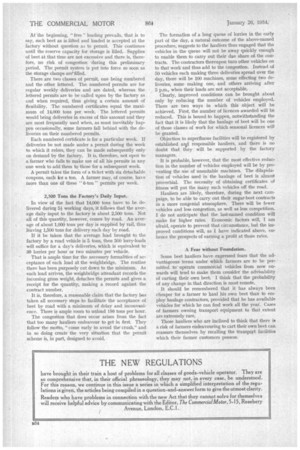How the New
Page 42

Page 43

Page 44

If you've noticed an error in this article please click here to report it so we can fix it.
ct Will Improve
BEET 1
okULAGE
THE close of the cm-rent sugar-beet campaign will, I anticipate, put a period to the unsatisfactory conditions under which the road transport of that commodity has hitherto been carried on. There is, perhaps, no branch of the road-transport industry which has suffered so much from the attentions of the irresponsible type of haulier.
The Road and Rail Traffic Act is likely to have the effect of weeding out many irresponsible hauliers, including those engaged in the cartage of sugar-beet. If it has that effect those who expect to obtain some profit from the haulage of beet will benefit accordingly arid will be a little more likely to realize their aspirations in that direction than has been the case for some time.
The Problems of Rate-cutting and Overcrowding.
The troubles of beet haulage of late years have been two-fold. First, there has been the inevitable ratecutting, and, secondly, overcrowding. I drew particular attention to the latter aspect in an article published in
The Commercial Motor at the close of the previous cam
paign. I pointed out then that, if the hauliers in each area were to get together and organize the work, allotting to each of their number convenient times for delivery to the factory, congestion would be considerably diminished.
The hauliers themselves would thus be able to earn the same revenue, using half the number of vehicles and B32
employing each vehicle for half the time that it was then being used for this work. Not only do too many hauliers engage in beet haulage, but between them they put more vehicles into commission than are necessary.
The economies rendered possible by the common-sense procedure indicated above would be sufficient to turn into quite a handsome profit the loss which is the experience of so many hauliers. The prevailing conditions— and I was sorry to observe that there was no improvement during the campaign just concluded—were a disgrace to the haulage industry and a source of perpetual annoyance to the factory officials.
The latter, indeed, are as anxious to bring about some improvement in these conditions as are the hauliers themseives. The blocking of the roads and of the factory yards by vehicles is productive of considerable disorganization and not a little excitement of temper. In more than one case the factory manager has been within an ace of forbidding entry to some drivers, because of their refusal to follow out instructions.
Readers of long standing will be aware that I have for many years kept in particularly close touch with this branch of the haulage industry, and The Commercial Motor has been influential in improving the conditions under which.deliveries of beet by road have been carried out. It is, therefore, only fair to point out that the authorities of the beet factories pow take all reasonable steps to facilitate the work of the hauliers.
As showing the efforts to that end, a brief description of the " permit " system is of interest. As an example, I shall take the method in vogue at the_Feldead factory of the Second Anglo-Scottish Beet Sugar Corporation. Ltd., which is under the control of Mr. H. E. B. Sheaves.
This permit system is drawn up in consultation with farmers who have contracted to supply beet to the factory. It is arranged so that, so far as is possible, a farmer's beet is hauled to the factory at a time convenient to him. The permits are spread, over the season, so that, generally speaking, the factory is provided with a steady supply of beet to keep it working for 24 hours per day, seven days per week, throughout the campaign. As it is customary for farmers to sow the beet so that it comes to maturity at different times, there is no difficulty in reaching an arrangement which is mutually satisfactory to both parties.
Facts and Figures About the Felstead Factory.
The capacity of the Felstead factory is 2,000 tons per clay, but, as deliveries are made during only 5.k working days, permits have to be issued to allow at least 14,000 tons to be delivered in that period. There is storage capacity for a reserve of 8,000 tons and loads are accepted at the factory from 7 a.m. until 5 p:rn. each weekday and until 1. p.m. on Saturdays Loads are not accepted outside these times unless there is an adequate reason for so doing. 'At the beginning, " free " loading prevails, that is to say, such beet as is lifted and loaded is accepted at the factory without question a3 to permit_ This continues until the reserve capacity for storage is filled. Supplies of beet at that time are not excessive and there is, therefore, no -risk of congestion during this preliminary period. The permit system is put into force so soon as the storage clamps are filled.
There are two classes of permit, one being numbered and the other lettered. The numbered permits are for regular weekly deliveries and are dated, whereas the lettered permits are to be called upon by the factory as and when required, thus giving a certain amount of flexibility. The numbered certificates equal the maximum of 14,000 tons per week. The lettered permits would bring deliveries in excess of this amount and they are most frequently used when, as must inevitably happen occasionally, some farmers fall behind with the deliveries on their numbered permits.
Each numbered certificate is for a particular week. If deliveries be not made under a permit during the week to which it refers, they can be made subsequently only on demand by the factory. It is, therefore, riot open to a farmer who fails to make use of all his permits in any one week to add them to those for a subsequent week.
A permit takes the form of a ticket with six detachable coupons, each iar a ton. A farmer may, of course, have more than one of these " 6-ton " permits per week.
2,500 Tons the Factory's Daily Input.
In view of the fact that 14,000 tons have to be delivered during 5i working days, it follows that the average daily input to the factory is about 2,500 tons. Not all of this quantity, however, comes by road. An average of about 1,000 tons per day-is supplied by rail, thus leaving 1,500 tons for delivery each day by road.
If it be taken that the average load brought to the factory by a road vehicle is 5 tons, then 300 lorry-loads will suffice for a day's deliveries, which is equivalent to 30 lorries per hour or two minutes per vehicle.
That is ample time for the necessary formalities of acceptance of each load at the weighbridge. The routine there has been purposely cut down to the minimum. As each load arrives, the weighbridge attendant records the incoming gross weight, detaches the permits and gives a receipt for the quantity, making a record against the contract number.
It is, therefore, a reasonable claim that the factory has taken all necessary steps to facilitate the acceptance of beet by road with a minimum of delay and inconvenience. There is ample room to unload 150 tons per hour.
The congestion that does occur arises from the fact that too many hauliers endeavour to get in first. They follow the motto, "come early to avoid the crush," and in so doing create the very situation that the permit scheme is, in part, designed to avoid.
The formation of a long queue of lorries in the early part of the day, a natural outcome of the above-named procedure, suggests to the hauliers thus engaged that the vehicles in the queue will not be away quickly enough to enable them to carry out their due share of-the contracts. The contractors thereupon turn other vehicles on to that work and thus add to the congestion. Instead of 50 vehicles each making three deliveries spread over the day, there will be 100 machines, some effecting two deliveries, some making one, and others arriving after 5 p.m., when their loads are not acceptable.
Clearly, improved conditions can be brought about only by reducing the number of vehicles employed. There are two ways in which this object will be achieved. First, the number of licences awarded will be reduced. This is bound to happen, notwithstanding the fact that it is likely that the haulage of beet will be one of those classes of work for which seasonal licences will be granted.
Objection to superfluous facilities will be registered by established amid responsible hauliers, and there is no doubt that they will be supported by the factory managers.
It is probable, however, that the most effective reduction in the number of vehicles employed will be by preventing the use of unsuitable machines. The dilapidation of vehicles used in the haulage of beet is almost proverbial. The necessity of obtaining certificates of fitness will put the inany such vehicles off the road.
Hauliers are likely, therefore, during the next campaign, to be able to carry out their sugar-beet contracts in a more congenial atmosphere. There will be fewer vehicles and less congestion, as well as less competition. I do not anticipate that the last-named condition will make for higher rates. Economic factors will, I am afraid, operate to prevent that circumstance, but the improved conditions will, as I have indicated above, enhence the prospects of earning a profit at those rates.
A Fear without Foundation.
Some beet hauliers have expressed fears that the advantageous terms under which farmers are to be permitted tooperate commercial vehicles from now onwards will tend to make them consider the advisability of carting their own beet. I think that the probability of any change in that direction is most remote.
It should be remembered that it has always been cheaper for a farmer to haul his own beet than to employ haulage contractors, provided that he has available vehicles for which he can find work all the year. Cases of farmers owning transport equipment to that extent are extremely rare.
Those hauliers who are inclined to think that there is a risk of farmers endeavouring to cart their own beet can reassure themselves by recalling the transport facilities which their farmer customers possess.




















































































